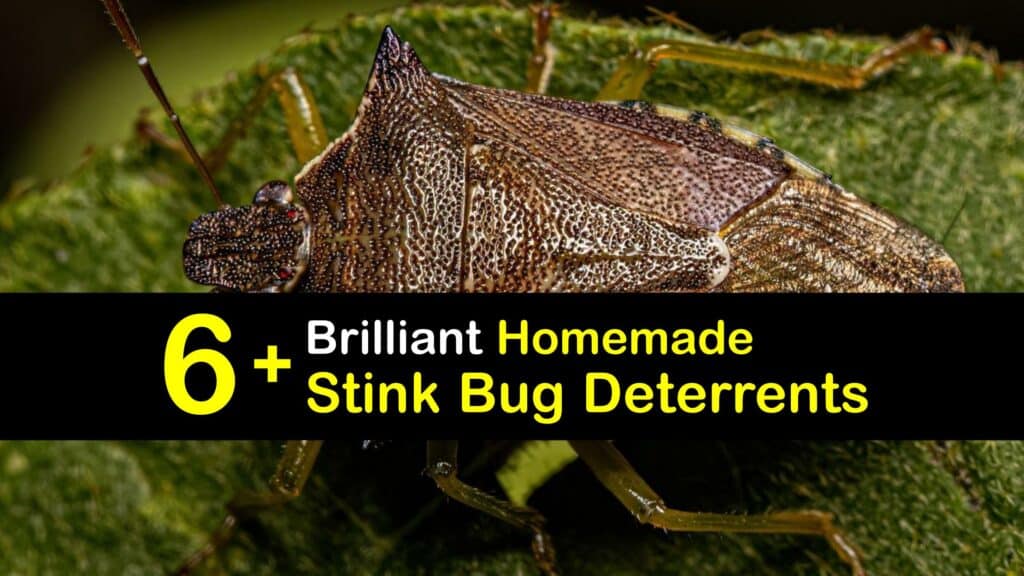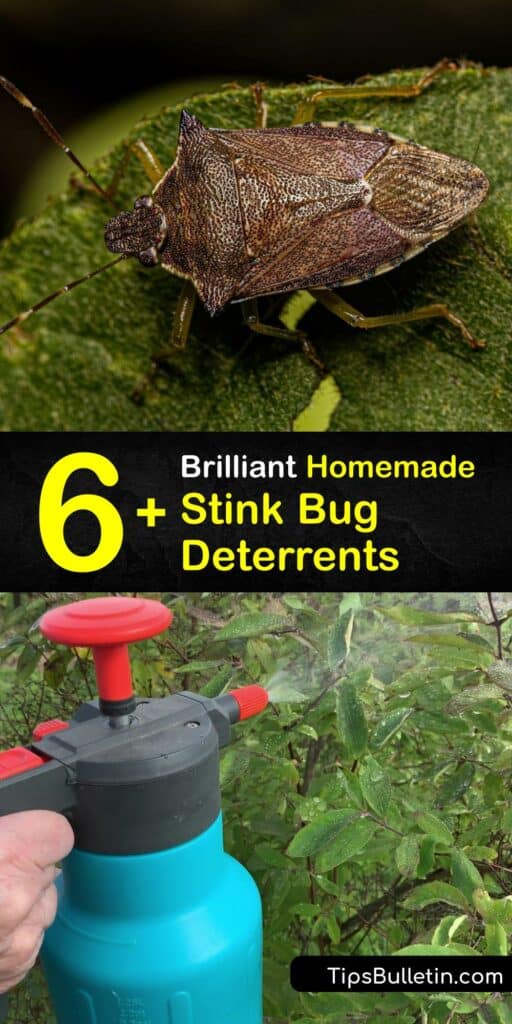Are you searching for a natural stink bug repellent? There’s nothing worse than an unexpected stink bug infiltration. These pests seem to spring up at the worst moments, decimate crops, or turn your house into a stinky and unpleasant place. Stink bugs are a common challenge faced by homeowners and gardeners alike.
These shield-shaped bugs emit a powerful odor that sinks into whatever it lands on, from textiles like rugs and carpets to walls. Stink bugs migrate indoors, seeking warmth and shelter during the colder months. While there, they proliferate. Although stink bugs don’t bite, they are a significant annoyance, and you’ll need a homemade stink bug deterrent to get rid of them.
Create a homemade stink bug repellent spray to save money and control the substances you use around your family. Follow simple tips and use ingredients you feel comfortable with to remove the stink bugs and eliminate the lingering smell.

Homemade Stink Bug Repellent Spray and Other Ideas
You probably prefer a natural stink bug repellent if you have pets or kids or are health conscious. While there’s a vast range of commercial insecticides, they typically rely on harsh chemicals and dangerous substances to destroy the stink bugs.
Trust homemade stink bug deterrent hacks with dish soap, neem oil, garlic, diatomaceous earth, and essential oils. Even simple items like dryer sheets repel stink bugs in your home. Follow along to find the best solution for you!
What Are Stink Bugs?
Stink bugs are somewhat ingrained in country living. These insect pests are often confused with Asian lady beetles and are known for their characteristic bad smell. Like the lady beetle, stink bugs feed on plant crops across North America.
They journey inside buildings in the colder months to seek shelter and become disruptive, thanks to their unpleasant odor. Stink bugs are identifiable by their characteristic shield-shaped bodies.

The two most common types are the green stink bug and the brown marmorated stink bug . A female stink bug lays an egg that hatches into a nymph and develops into an adult insect to continue the life cycle. Tackle a stink bug population as soon as you notice it to stop it from taking over your home or garden.
Garlic As Natural Stink Bug Repellent
Garlic is an all-natural method to repel stink bugs from your yard. Though garlic spray is safe to use indoors, it has an overpowering smell most people find unpleasant. Craft an efficient spray for repelling stink bugs from your garden. Stink bugs despise the pungent smell of garlic and move away to avoid it.
Peel the garlic, halve the cloves, and place them in a pot. Cover the cloves in water and heat until boiling. Leave the ingredients to cool and steep overnight. Sift out the chunks with the cheesecloth or sieve and transfer the remaining liquid to a spray bottle. Shake the bottle well, and spritz in areas where stink bugs congregate.
Homemade Stink Bug Deterrent With Dish Soap
Dish soap is a readily available stink bug treatment a lot of us already have on hand. We typically keep a bottle of dish soap by the sink to clean our cookware, but it’s an excellent and affordable stink bug remedy, too.
Stink bugs rely on pores in their waxy exterior coverings to breathe. Dish soap clogs these holes, causing them to asphyxiate and perish rapidly. Make a straightforward stink bug spray with supplies you already have by blending dish soap and water in a spray bottle.
Measure the dish soap and water into a sprayer, shake vigorously, and use directly on an egg mass or adult stink bug. Treat stink bugs with the spray every time you spot them until no evidence of the insects remains.
Stink Bug Repellent Spray With Neem Oil
Neem oil is known for killing harmful and nuisance bug populations without destroying beneficial insects. It’s also safe for plants, making it an excellent choice for indoor and outdoor stink bug control. Neem oil is a natural product harvested from the neem tree with a rare insecticidal active ingredient.
Find neem oil in gardening stores. A little oil goes a long way to give you a cost-effective natural insecticide to eradicate the stink bugs and keep on hand for future pest control.
Add neem oil to a spray bottle of water according to the measures on the package. Spray the neem concoction onto stink bugs, stink bug eggs, and regions they tend to inhabit.
If you spray it outdoors, using neem oil to control stink bugs is best first thing in the morning. This gives it time to dry and become harmless before helpful insects such as bees, butterflies, and other pollinators visit your yard.
DIY Stink Bug Repellent – Diatomaceous Earth
Diatomaceous earth is an efficient natural pest control, perfect for eliminating stink bugs in and outdoors. This fine white powder is sold at gardening stores and made from the fossilized remains of phytoplankton.
Diatomaceous earth is non-toxic and won’t harm your family or pets, yet its sharp particles lacerate the exteriors of stink bugs, causing death. Sprinkle diatomaceous earth in areas where stink bugs are problematic.
Be sure to use a dust mask while working with diatomaceous earth, as the sharp particles are irritating if you accidentally inhale them.
Essential Oils for Stink Bug Infestation
Essential oils have various uses, from medicinal and health purposes to pest control. Stink bugs detest the smell of specific essential oils, making them a powerful tool to force them off your property.
It’ll keep them from coming in the first place. Choose an essential oil based on your scent preferences and availability. Use this natural deterrent to protect against these annoying insects.
Drip a few drops of your preferred essential oil onto cotton balls and set these out to keep stink bugs at bay. Alternatively, mix 20 drops of the essential oil with two cups of faucet water in a sprayer and use this as a stink bug deterrent spray.
Preventing Stink Bug Issues
Cutting off their access is one of the simplest ways to keep the stink bugs out of buildings. Seal spaces around windows, doors, chimneys, and other openings. Light lures stink bugs, so it’s best to use as little lighting as possible in your garden and around the exterior of your house.
Eliminating moisture around buildings helps lower the likelihood of stink bugs moving in. Fix clogged drains and leaking pipes promptly. Keep your food in plastic containers and ensure your trash cans are sealed and regularly emptied.
Store your firewood away from your residence, as it attracts pests. If stink bugs invade your property, use an integrated pest management approach and address them with multiple methods for the best results.
Did this article give you the perfect homemade stink bug repellent spray recipe? Whether you prefer a stink bug trap or a natural spray, there are many options for pest control. A stink bug invasion makes your space smelly fast. Fortunately, there’s no need to put up with the unpleasantness.
Rely on helpful tricks to eradicate the stink bugs from your surroundings without introducing dangerous chemicals into your home. Combine a couple of pest control techniques for an integrated approach to ensure your stink bug woes resolve quickly.

If you loved this comprehensive article on natural stink bug repellent tricks, please share it with your friends and family who need a homemade stink bug deterrent on Pinterest and Facebook.